
Aftermath of Eaton fire. (Photo by Jacqueline García / CALÓ News)
Leading experts gathered together last week to discuss how Latino communities were among the most affected from the January wildfires in Southern California.
A new report from the UCLA Latino Policy & Politics Institute (LPPI), highlights the unique vulnerabilities Latino communities face, including higher exposure to air pollution, uninsured rates and barriers to disaster aids. These factors amplified the urgent need for equitable health and climate policies to protect Latino communities from future wildfires in California.
The report, informing how Latinos and other communities of color are impacted from domestic policy, was developed with the support of the California Wellness Foundation, the California State Legislature and the California Latino Legislative Caucus.
Darrell Roberts, vice president of the California Professional Firefighters, spoke at the meeting about how these wildfires are becoming larger and more destructive than ever before and becoming increasingly difficult for these communities to rebuild.
This report showcased one of the major consequences of the recent wildfires, it was estimated that at least over 300,000 Angelenos had been affected. Among them were at least 74,000 Latinos, representing about one-in-four of those who were impacted.
Roberts spoke about his time being a part of the search and recovery team during the wildfires through the Federal Emergency Management Agency (FEMA) as a rescue specialist. By teaming up with other specialists during the search, such as ortho physicians, they were able to recognize bones from the fire’s aftermath and searched through structures for other possible remains.
“We spent several days in Altadena, I have never seen so much destruction before in the last 26 years by that community. My words were ‘absolutely devastated,’” Roberts continued, “I would also say that I saw a community that rallied around each other.”
As California is known for these intense wildfires, Dr. Ilan Shapiro, a representative of AltaMed Health Services, pointed out that these Latino communities will be exposed to pollutants, ashes from the fires and other toxic materials.
Latino neighborhoods experienced twice the level of air pollution compared to white neighborhoods. The long term health effects will only worsen due to Latino communities exposure to preexisting pollution burdens, including diesel particulate matter.
“These elevated pollution levels contribute to significant health inequities, such as asthma-related emergency room visits, which average 67 per 10,000 people in Latino neighborhoods, compared to just 25 per 10,000 in white neighborhoods,” according to the LPPI report.
A majority of Latino-faced exposure to the wildfire smoke because of their work involving the outdoors, like agriculture, construction and landscaping. Due to the significant health risks involved, this often disrupted Latinos’ ability to work and led to their income being affected, according to the LPPI report.
It’s also highlighted that many of these workers who live in Latino neighborhoods are also traveling to work to those affected areas. Roberts recalled continuing to see workers conducting outdoor labor work outside while evacuations were still being conducted.
In 2023, LPPI conducted a survey of Latino small businesses and households, who are often behind in being prepared for emergencies and safety-net programs.
Using data from the US Census Bureau’s Household Pulse Survey (HPS) and California’s Emergency Rental Assistance Program (ERAP), it was found that these large ethnic disparities are due to two characteristics: limited English proficiency and immigration status.
The survey revealed that about 28% of all small businesses reported not having flood, earthquake or fire insurance, despite the financial protection offered by these policies.
“Immigrants are generally distrustful of government programs, and immigrants who are not yet naturalized may be concerned that their participation in safety-net programs may identify them as a public charge,” the report stated.
The meeting touched on the sense of urgency to make sure families have a plan and use this as an opportunity to plan ahead, including preparing a to-go bag because no one expects a knock on the door or a text alert about the need to evacuate due to a fire approaching near their home.
“The questions for us are, ‘Are we planning for that future?’ and ‘are we planning to make sure that we are ready to try to mitigate as much as we can?’ And if it happens, ‘What is our plan? How are we going to take care of those kids or our elderly?’” said Shapiro.
In a statement from Eduardo Garcia, a senior LPPI advisor, this latest research shows that these wildfires in California are not just an environmental crisis, but a public health and economic issue that greatly affect the Latino communities.
“If we want to protect the health and safety of our communities, we need policies that address the root causes of these crises,” Garcia stated.
The immediate impact on the neighborhoods affected directly from these disasters is the importance of recognizing what these burdens will have on Latino neighborhoods. It highlights the importance of preparing a disaster response and other strategies to protect the health, safety and livelihoods of Latinos by addressing these systemic disparities.

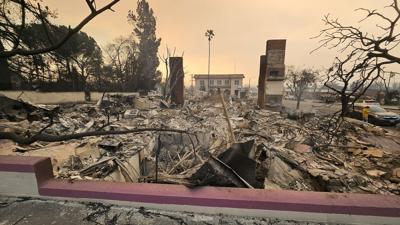
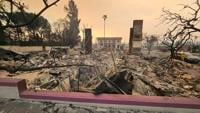

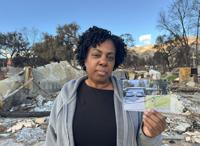

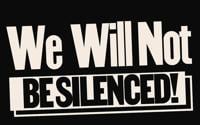

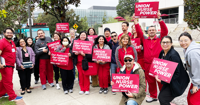

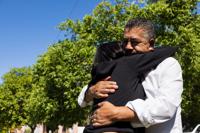
(0) comments
Welcome to the discussion.
Log In
Keep it Clean. Please avoid obscene, vulgar, lewd, racist or sexually-oriented language.
PLEASE TURN OFF YOUR CAPS LOCK.
Don't Threaten. Threats of harming another person will not be tolerated.
Be Truthful. Don't knowingly lie about anyone or anything.
Be Nice. No racism, sexism or any sort of -ism that is degrading to another person.
Be Proactive. Use the 'Report' link on each comment to let us know of abusive posts.
Share with Us. We'd love to hear eyewitness accounts, the history behind an article.